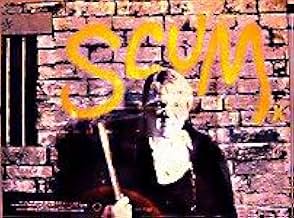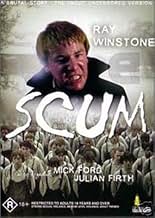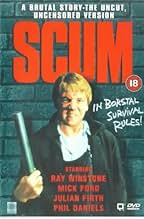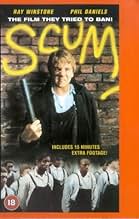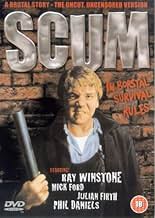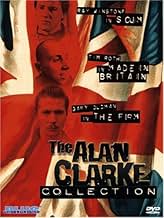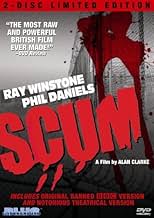NOTE IMDb
7,6/10
14 k
MA NOTE
Le récit sans concession de la vie dans un centre de détention pour mineurs britannique dans les années 70.Le récit sans concession de la vie dans un centre de détention pour mineurs britannique dans les années 70.Le récit sans concession de la vie dans un centre de détention pour mineurs britannique dans les années 70.
- Réalisation
- Scénario
- Casting principal
Philip DaCosta
- Jackson
- (as Philip Da Costa)
Histoire
Le saviez-vous
- AnecdotesCarlin was originally a Glaswegian, but was changed into a Cockney when Alan Clarke saw a then-unknown Ray Winstone walk in a unique way.
- GaffesAll borstal inmates were subject to the same mandatory short-back-and-sides haircut, yet a vast array of hairstyles are shown throughout the film, including afros.
- Versions alternativesNorwegian cinema version was cut in the rape scene and the suicide scene. Later video versions are uncut.
- ConnexionsFeatured in The South Bank Show: Keith Jarrett/Scum (1979)
- Bandes originalesDirty Last Night
(uncredited)
Music by John Dickson and Elfed Hayes
De Wolfe Music Ltd
Commentaire à la une
The grandaddy of 'incarceration' films - this is one of the best, oft copied but never bettered.
I liked it because it's so damn British. The one liners are legion; you all know what they are and where, but among a stellar list 'Mecca, Archer' rises just above and never fails to have me in fits. The way Goodyear looks at the Governor just after this great outburst is also revealing; as is the look of satisfaction on Archer's face when he finally succeeds in riling the 'religious maniac'.
Of course, there's a serious message in here; expedited best in the conversation between Archer and Mr Duke over 'coffee'. Analysing the situation, as Archer attempts to do, will simply not be tolerated and is interpreted as dissent by a man who embodies the 'system' and is intellectually and emotionally unequipped to deal with his own, and the State's ultimate failure to deliver.
Like true class acts, this film works on several levels; it's a no nonsense drama bedecked with Taj Mahal one liners everyone loves, yet it also works on a deeper level; you cannot punitively 'correct' all offenders with violence and cruelty. You are not corrected, you are merely broken, as Davis and Toyne are. If you're not broken, you run amok, but the point is you're not 'cured'.
When this film was on TV in 1983, just after Channel Four started broadcasting, they edited the notorious potting shed sequence to such an extent that the heinous act committed was virtually excised, thereby diluting the dramatic effect to virtually zero. Interestingly enough, they also edited out the bit where Mr Greaves ignores Davis' second press of the bell. Why? Presumably because they feared the ire of the State at the highlighting of its inadequacies? I suppose they can be forgiven, Channel Four was new then after all, but it's quite revealing nonetheless.
If I'm home alone, I quote this film as I'm wandering around the house. I don't quite know why. It's all about the importance of individuality, standing up for yourself and not just 'accepting' things. That's probably the reason. Now, where's your tool?
I liked it because it's so damn British. The one liners are legion; you all know what they are and where, but among a stellar list 'Mecca, Archer' rises just above and never fails to have me in fits. The way Goodyear looks at the Governor just after this great outburst is also revealing; as is the look of satisfaction on Archer's face when he finally succeeds in riling the 'religious maniac'.
Of course, there's a serious message in here; expedited best in the conversation between Archer and Mr Duke over 'coffee'. Analysing the situation, as Archer attempts to do, will simply not be tolerated and is interpreted as dissent by a man who embodies the 'system' and is intellectually and emotionally unequipped to deal with his own, and the State's ultimate failure to deliver.
Like true class acts, this film works on several levels; it's a no nonsense drama bedecked with Taj Mahal one liners everyone loves, yet it also works on a deeper level; you cannot punitively 'correct' all offenders with violence and cruelty. You are not corrected, you are merely broken, as Davis and Toyne are. If you're not broken, you run amok, but the point is you're not 'cured'.
When this film was on TV in 1983, just after Channel Four started broadcasting, they edited the notorious potting shed sequence to such an extent that the heinous act committed was virtually excised, thereby diluting the dramatic effect to virtually zero. Interestingly enough, they also edited out the bit where Mr Greaves ignores Davis' second press of the bell. Why? Presumably because they feared the ire of the State at the highlighting of its inadequacies? I suppose they can be forgiven, Channel Four was new then after all, but it's quite revealing nonetheless.
If I'm home alone, I quote this film as I'm wandering around the house. I don't quite know why. It's all about the importance of individuality, standing up for yourself and not just 'accepting' things. That's probably the reason. Now, where's your tool?
- philkessell
- 10 juin 2005
- Permalien
Meilleurs choix
Connectez-vous pour évaluer et suivre la liste de favoris afin de recevoir des recommandations personnalisées
- How long is Scum?Alimenté par Alexa
Détails
- Date de sortie
- Pays d’origine
- Site officiel
- Langue
- Aussi connu sous le nom de
- Scum - Abschaum
- Lieux de tournage
- Sociétés de production
- Voir plus de crédits d'entreprise sur IMDbPro
Box-office
- Budget
- 250 000 £GB (estimé)
- Montant brut aux États-Unis et au Canada
- 6 461 $US
- Week-end de sortie aux États-Unis et au Canada
- 1 948 $US
- 18 juin 2017
- Montant brut mondial
- 6 461 $US
- Durée1 heure 38 minutes
- Mixage
- Rapport de forme
- 1.66 : 1
Contribuer à cette page
Suggérer une modification ou ajouter du contenu manquant



